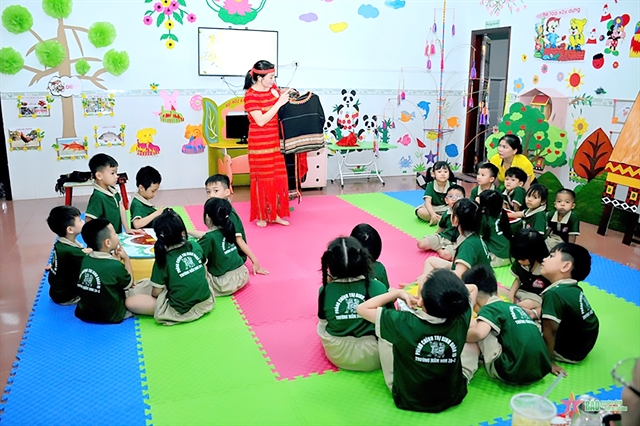Border children encouraged to go to school against the odds
Society – Economy - Ngày đăng : 09:25, 20/12/2024
 |
| Teachers and children at 20-2 Kindergarten of the Army Corps 15. — Photo qdnd.vn |
GIA LAI — Despite a variety of obstacles, the Army Corps 15 still places a high priority on preschool education in the Central Highlands region.
For the corps’ soldiers, persuading parents from ethnic minority groups to send their children to school is a difficult task.
Creating the best conditions for the children, including a place to eat, rest and an ideal learning environment, requires even more effort, determination and sacrifice from those who "sow seeds" at the country’s border line in Gia Lai Province.
On a visit to Rơ Mah Duet's farm in the province's Đức Cơ District, Major Phạm Văn Hưng, captain of Team 12, Company 72, asked: "Why don’t you let the children go to school? Why let them wander around the field like this?"
Duet, holding his youngest child, an infant, said: "Our family is going through a really challenging time.”
Major Hưng’s question is a concern for the Army Corps 15’s soldiers. Duet's answer also partly expresses the hardships of local residents and the obstacles children face on their journey to literacy.
The difficulty Duet mentioned is not simply about economic conditions, but also about barriers of awareness.
People's lives in the border regions have seen a significant transformation in recent years. But for a variety of reasons, children continue to live in underprivileged conditions.
Due to high poverty rates and low education levels, most people in the border areas do not fully understand the importance of education for children.
Every day, barefoot and bareheaded children still accompany their parents to the fields. They are frightened before strangers, and many children in isolated areas aren't even able to speak Vietnamese.
At some schools in the border areas of Chư Prông District, 90 per cent of the students belong to ethnic minority groups.
To maintain a stable number of students, teachers sometimes travel to the homes of absent children to convince their families to send them to school.
On rainy days, students who live far away find it especially hard to get to school. Teachers must go to each home to pick up the children.
Officers and soldiers of Army Corps 15 encourage local residents to work at rubber plantations for a stable income, and persistently encourage them to send their children to school.
Colonel Khuất Bá Cao, Party secretary and deputy commander of Army Corps 15, said: “The foundation that helps ethnic minority people feel secure is that their children are cared for and educated wholeheartedly.”
The Army Corps has built 11 schools to teach nearly 7,000 students, of which more than 70 per cent are children of ethnic minority groups in the Central Highlands, he said.
The corps has made an investment in modern facilities and equipment.
Teacher Trần Thị Lan at Rose Kindergarten said children at first felt timid, but have now gained confidence in speaking the common language after spending time with their teachers. They can also read poetry, dance, sing and tell stories.
18-4 Kindergarten in Đức Cơ border district under the management of Army Corps 15 has waived tuition for students from ethnic minority groups and provided financial assistance for their daily school meals.
One example of a school with modern facilities for border children is Sao Mai Kindergarten in Đức Cơ District, which is a part of Company 75, Army Corps 15.
According to Lieutenant Colonel Dương Kim Tuấn, director of Company 75, preschool education is crucial because it establishes the groundwork for children's future growth. To enhance the quality of education, the company has invested in facilities, outdoor toys and teaching equipment. — VNS
